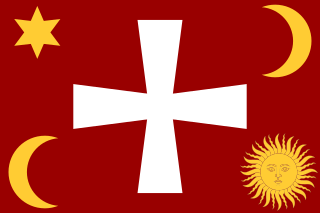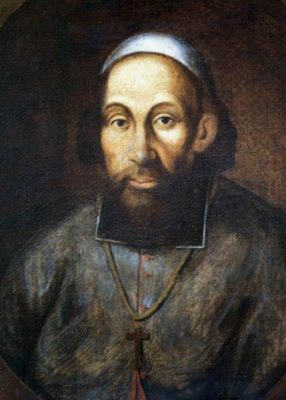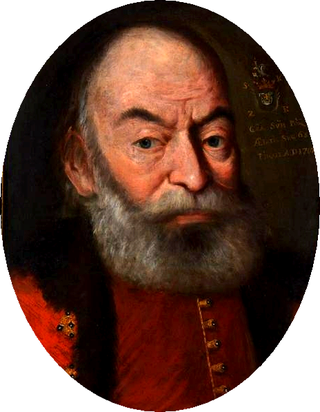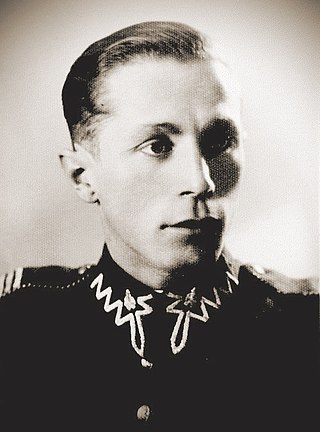
Stephen Báthory was Voivode of Transylvania (1571–1576), Prince of Transylvania (1576–1586), King of Poland and Grand Duke of Lithuania (1576–1586).
The Stefan Batory Foundation is an independent Polish non-government organization established by American financier and philanthropist, George Soros, along with a group of Polish opposition leaders of 1980s, and registered in Poland since May 1988. It is named after Stephen Báthory, the 16th-century Polish king. The foundation's mission is to support the development of an open, democratic society in Poland along with other Central and East European countries.

Jan Sariusz Zamoyski was a Polish nobleman, magnate, statesman and the 1st ordynat of Zamość. He served as the Royal Secretary from 1565, Deputy Chancellor from 1576, Grand Chancellor of the Crown from 1578, and Great Hetman of the Crown from 1581.

The Parnawa Voivodeship was a unit of administrative division and local government in the Duchy of Livonia, part of the Polish–Lithuanian Commonwealth, since it was formed in 1598 until the Swedish conquest of Livonia in the 1620s. The seat of the voivode was Parnawa (Pärnu).

The Inflanty Voivodeship, or Livonian Voivodeship, also known as Polish Livonia, was an administrative division and local government in the Polish–Lithuanian Commonwealth, since it was formed in the 1620s out of the Wenden Voivodeship and lasted until the First Partition of Poland in 1772. The Inflanty Voivodeship was one of the few territories of the Polish–Lithuanian Commonwealth to be ruled jointly by Poland and Lithuania.
Jan Kostka was a Polish noble and a candidate in elections for the new King of Poland in 1572. He was also an advisor to Kings Henry of Valois and Stefan Batory.

Registered Cossacks comprised special Cossack units of the Polish–Lithuanian Commonwealth army in the 16th and 17th centuries.

Jan Dymitr Solikowski was a Polish writer, diplomat, Archbishop of Lwów.

Jan Tarnowski was Archbishop of Gniezno and Primate of Poland. His coat of arms was Rola.

Stanisław Karnkowski of Junosza (1520–1603) was the Great Referendary of the Polish Crown, the Great Secretary of Poland, bishop of Włocławek (1567-1580) as well as archbishop of Gniezno and Primate of Poland. He served during the Interrex in 1586–1587, before the coronation of Sigismund III Vasa.

Samuel Zborowski was a Polish military commander and a notable member of the szlachta. He is best remembered for having been executed by supporters of the Polish king Stefan Batory and chancellor Jan Zamoyski; an event which caused much uproar among the contemporary Polish nobility.

MS Batory was a Polish ocean liner which was the flagship of Gdynia-America Line, named after Stefan Batory, the sixteenth-century King of Poland. She was the sister ship of MS Piłsudski. After Allied wartime service, mainly under the UK Admiralty, she became in 1951 the flagship of the Polish Ocean Lines and the Polish merchant fleet. She is often described as the "Pride of the Polish Merchant Marine". Batory along with her sister Piłsudski were the two most popular ocean liners of Poland.

The TS/S Stefan Batory was an ocean liner built in the Netherlands in 1952. It was operated by Holland America Lines and later Polish Ocean Lines. It remained in service until 1988 and was scrapped in 2000 in Turkey.

Józef Batory was a Polish soldier and resistance fighter during World War II and after.

The Battle of Lubieszów, which occurred on 17 April 1577, was the most crucial battle in the two-year Danzig Rebellion fought between the forces loyal to the newly elected King Stefan Batory of the Polish–Lithuanian Commonwealth and the Commonwealth's most prosperous city, Gdańsk, following the city's refusal to accept the election of Batory as monarch of the Commonwealth which had taken place on 15 December 1575. The battle took place to the west of the town of Tczew (Dirschau), southeast of Gdansk on the left bank of the Vistula River, near Lubieszów Lake and the modern village of Lubiszewo Tczewskie. While it was not a decisive victory insofar as Gdansk itself was not taken and the war raged on, the city, having lost much of its wealthy citizenry, did finally to come to terms with the king at the end of the year.
Ivan Bátory is a Slovak cross-country skier who has competed at the international senior level of cross-country skiing since 1993. He was born in Liptovský Mikuláš and lives in Uhorská Ves. As a cross-country skier, he competed for Štrbské Pleso SC.

Batory High School is a public secondary school founded on 1 September 1918 and located at 6 Myśliwiecka Street in Warsaw, Poland. It is one of the best and most prestigious high schools in Poland. Famous alumni include among others composer Witold Lutosławski and poet and Home Army soldier Krzysztof Kamil Baczyński, killed during the Warsaw Uprising.

The free election of 1587 was the third royal election to be held in the Polish–Lithuanian Commonwealth, which took place after the death of King Stefan Batory. It began on June 30, 1587, when Election Sejm was summoned in the village of Wola near Warsaw, and ended on December 27 of the same year, when King Sigismund III was crowned in Kraków’s Wawel Cathedral.

Ronald L. Batory is an American railroad industry executive who served as the Administrator of the Federal Railroad Administration from 2018 to 2021. Batory has over 45 years of leadership experience in the railroad industry, including serving as president and chief operating officer of Consolidated Rail Corporation and as president of the Belt Railway of Chicago. According to a 2012 Fred Frailey article, "all Ronald Batory has ever wanted to do is work for a railroad."
Batory is the Polish spelling of the name of the Hungarian Báthory noble family.














